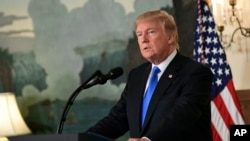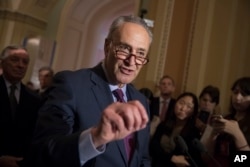U.S. President Donald Trump voiced his opposition Wednesday to a bipartisan accord on national health law changes, a day after saying he supported it.
White House spokeswoman Sarah Huckabee Sanders said Wednesday, "We've said all along that we want something that just doesn't bail out the insurance companies but actually provides relief for all Americans. And this bill doesn't address that fact. We think that this is a good step in the right direction. This president certainly supports Republicans and Democrats coming to work together, but it's not a full approach, and we need something to go a little bit further to get on board."
A two-year accord between Republican Senator Lamar Alexander and Democratic Senator Patty Murray came after weeks of negotiations between the two in the aftermath of failed efforts in recent months by the Republican-controlled Senate to repeal and replace the Affordable Care Act, the seven-year-old health care law championed by former President Barack Obama commonly known as Obamacare.
Trump, at a White House news conference on Tuesday, called the deal, which would have to be approved by Congress, "a short-term solution."
"Lamar has been working very, very hard with ... his colleagues on the other side and Patty Murray is one of them in particular. And they're coming up and they're fairly close to a short-term solution," Trump said.
On Wednesday morning, however, Trump posted a tweet that focused on financial gains for insurance companies and made no mention of his position on the deal.
Trump said he still wants to overhaul Obamacare under an already-defeated plan to send federal money in block grants to each of the country's 50 states and allow them to set their own policies for providing health care for poorer Americans.
Trump last week ended subsidies to insurance companies — about $7 billion annually in reimbursements the government was paying to the insurers to offset their costs to provide cheaper insurance policies to low-income people.
"This is money that goes into the insurance companies to line their pockets, to raise up their stock prices," Trump said at Tuesday's briefing.
The Alexander-Murray agreement would restore those payments, a policy heavily favored by Democrats and some Republicans.
At the same time, in a proposal aimed at winning Republican support for the compromise, state governors, rather than state legislatures, would be given the right to approve insurance plans that provide "comparable affordability" to Obamacare plans on the market, Alexander said.
Without Trump's support, the compromise stands little chance in Congress as a stand-alone piece of legislation, but some Democrats voiced the hope they might be able to attach it to other must-pass legislation in early December when funding for government operations expires.
When asked Wednesday whether the proposal has the president's support, Alexander said he has had three conversations with Trump and gave him "full credit for engineering this bipartisan agreement."
"He told me that he wanted to encourage me, but that he will review it as I would expect a president to do," Alexander said. "He might want to add something to it. It may come up as part of end of the year negotiations, we'll see. But I think the president understands that there's a gap between now and whenever a block grant bill could take effect, which could be 2021 or 22 and during that gap we don't want chaos with millions of Americans hurt."
Senate Minority Leader Charles Schumer offered his reaction to the proposal Tuesday, saying, "We've achieved stability if this agreement becomes law."
While Democrats have uniformly lined up in support of Obamacare, Republican lawmakers have tried unsuccessfully dozens of time to repeal the law, which is anathema to them chiefly because it requires most Americans to buy health insurance, or pay a fine if they do not. No Republican voted for Obamacare in 2010 when a Democratic-controlled Congress narrowly passed it, with many Republican lawmakers calling it government over-reach because of the tax provision.
Since then, the law has gained in popularity, with national polls showing a majority of Americans want to keep it.
Most American workers get their health insurance coverage through their employers, with the government subsidizing health care payments for older, disabled and poorer Americans. Those most affected by the latest fight over the law are the 20 million people who get insurance under Obamacare, buying their insurance as individuals rather than helping pay for it at a workplace.

























